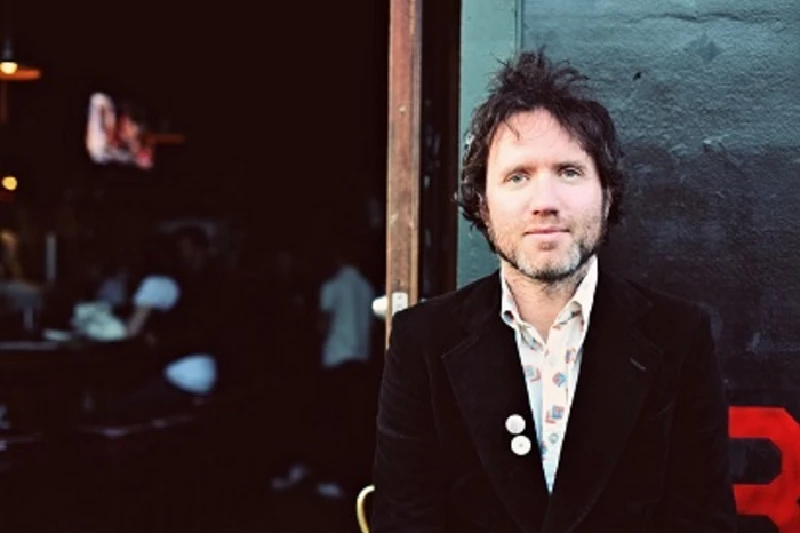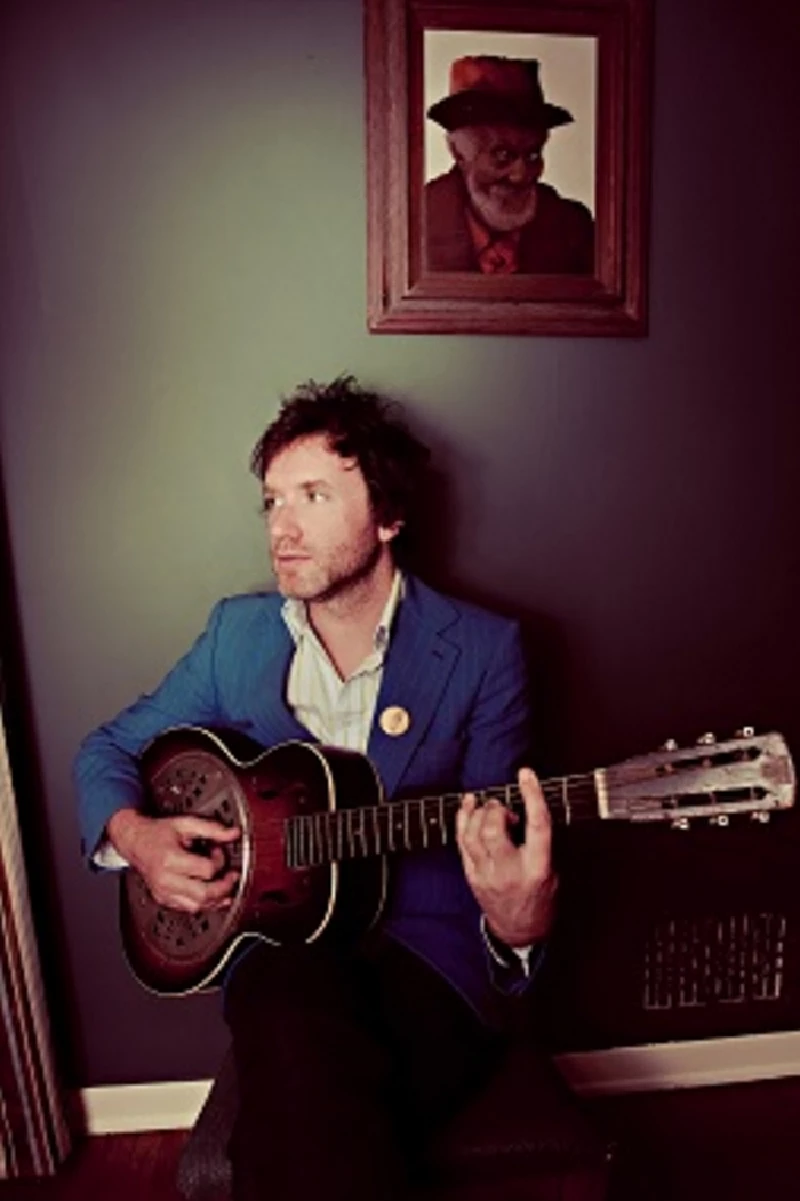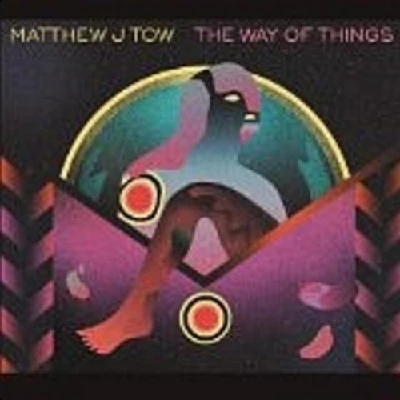Matthew J Tow - Interview
by Carl Bookstein
published: 31 / 8 / 2013

intro
Carl Bookstein talks to Australian singer-songwriter and Lovetones' front man Matthew J Tow about his debut solo album, 'The Way of Things'
Australian singer-songwriter and psychedelic music composer Matthew J Tow has just issued his debut solo album 'The Way of Things'. The new album comes out twenty years into a prolific career, highlighted by work with Drop City, the Brian Jonestown Massacre and ten years as front man of the Lovetones. The Lovetones’ 2009 album 'Dimensions' is a lush, yet understated epiphany. Their 2010 follow-up 'Lost' is a worthy successor. Now, stepping out on his own, Tow makes an equally powerful impression. Tow’s songwriting was born from a melding of 1990's indie rock and 1960's psychedelic revival. His sense of melody conjures such greats as Bowie and Lennon/ McCartney. 'The Way of Things' achieves both an intimacy and a richness. The opening track 'Night and Day' is subtly symphonic. 'It’s Gonna Be Alright' is great healing pop song craft. His journey has covered territory from Sydney to the States. His music is dependably inspired. Matthew J. Tow spoke with Pennyblackmusic in 2009, following the release of the 'Dimensions' album. In this second interview he graces us with another set of thoughtful insights. PB: Why did you decide to create and release what is billed as your debut solo album at this time? And are you happy with the results? MT: After more than twenty years of touring and making records under different guises, I was at a point where I wanted to push myself as a songwriter a bit more. Sort of put everything to one side that had gone before, shed my skin and begin again in a way. With making this record a ‘solo’ project, it signified a point in my creative life where I want to try something entirely different. I think it’s important that to grow as an artist one must continually try to challenge oneself. I tried to free myself of any constraints or preconceived notions that I had of ‘how to write songs’. Something that wasn’t specific to any genre or musical style that I was associated with in the past. It was quite liberating really, and I’m incredibly proud of the results. Of course, no man is an island, and it was a real collaborative effort. It wouldn’t be the record it is without the great production work and guidance from Collin Hegna and Ryan Carlson van Kriedt. PB: On 'Worlds Collide' the lyric is “When all of my answers turn into questions.” Are you as a person and a songwriter finding some answers at this point in your journey? MT: The song is just that really. Not getting the answer you thought you’d get or want, but rather finding the answer you need in the form of another question. But, yes, I’m still trying to figure this all out like everyone else. The more you try and figure it out, the more you realize that there is no one definitive answer or way forward. The other problem is that inevitably self-discovery always leads to more questions which take you down a different rabbit hole. That’s life I guess, but I’m really anticipating some kind of divine intervention soon. I’m nearly 42 after all! I think that in many ways songwriters and all creative people are a little more fortunate in that they have an outlet and an opportunity to express themselves through the medium of their art. But, in the end, it doesn’t make the process of discovery or personal growth any less painful. PB: What is on the future calendar for the Lovetones? MT: The Lovetones are in hiatus right now. We had a pretty good run for ten years, and I’m really proud of all our records. I think that eventually people will start to slowly discover the band and perhaps appreciate what we did more over time. It’s difficult to predict these kinds of things, but hopefully we will be able to reconcile the marriage and get back on the road at some point, and perhaps even do a new record down the track. PB: Did you have in mind any particular musical influences when writing the new album? Artists you’ve been listening to, perhaps? MT: I try and steer clear of listening to too much music whilst I’m writing. To be honest, these days I find that it just interferes with my writing process. I’ll be in the middle of something, then I’ll hear a song and think, "That sounds good. Why not try something a little like that?" You end up chasing something far removed from the initial idea itself, which for me becomes counter productive, hindering the creative process. Of course, there is no such thing as creativity without the influence of what has gone before and what is happening around you at any given point in time. I’m as much influenced by a conversation or reading a science article or what’s happening in the political sphere as anything musical. These days I listen to very little current music, but I am by no means a retrograde and every so often something will peak my interest. It’s just that there is so much music around that it’s almost impossible to keep up! PB: When did you first become interested in and then begin to create psychedelic music? MT: I first became interested in psychedelic music around my late teens. I think, like most young music fans, I discovered a few key bands and worked my way backwards. At that point I was really into what was coming out of the U.K in the mid to late 80’s. I was obsessed with bands like the Smiths and the Cure. Then I took some acid that a friend gave me and I listened to ‘Sgt. Pepper’. It’s probably a cliché, but it changed everything for me! I think I became hard wired from then on, and it became all about making perfect psychedelic pop. PB: How did you actually hook up with Anton Newcombe and come to be a part of the Brian Jonestown Massacre in 2003? Did you reach out to him? Did he reach out to you? MT: Anton and I met through a mutual friend of ours whilst I was in the States in 1997 touring with my first serious band, Drop City. We were staying in L.A., and a friend asked if I had heard of them. I think ‘Give It Back’ was the first record I listened to. I immediately felt a real kinship and connection with what those guys were doing ,and it wasn’t far off from what Drop City were all about. You have to remember that the Australian ‘indie psyche’ scene in the 90’s was pretty small, so any band that was doing similar stuff you really paid attention to. We were then introduced and we spent a few days staying with them, and the friendship grew from there. We talked many times about me coming over and being part of the BJM. Anton really helped out in so many ways with my music by introducing me to lots of like minded people including Greg Shaw who originally was going to release some Drop City records in the States. Unfortunately that never happened but a few years later in 2003 we released the first Lovetones album in the U.S through Bomp!, and I was able to then spend some time in the States touring and recording with the Jonestown. PB: Do you find psychedelic music offers particular inroads to truth? MT: That is the million dollar question! I’m not sure that it does really. I would say that it does inspire you to be innovative by perhaps taking you on a different path to creativity that you may not have considered before. But the more I think about it, I feel that it’s just another means of attaining one version of the truth. Psychedelic music isn’t the ‘be all and end all’ when it comes to gaining some sort of profound insight or enlightenment, because there are as many ways to attain enlightenment and to discover truth, as there are stars in the universe. PB: Who among songwriters most inspired you to do what you do? MT: For me, there are so many great songwriters that have been able to offer something unique to the vast canon of contemporary music, and who have profoundly inspired and moved me and changed the way I perceive the world. I never grow tired of listening to them and the amazing thing is I can always find something new in the music that I have never heard before. I think that is the true test. Not only do they make beautifully crafted and amazing sounding records, but the music is always changing in subtle ways every time you listen to it, never becoming tiresome. Some of these ones that made the biggest impact on me in my early development as a songwriter were Ray Davies, Morrissey/Marr, Lennon/McCartney, Lou Reed. PB: Does the song 'It’s Gonna Be Alright' reflect a personal optimism about the present moment and the future, or are you and the song more ambivalent? MT: I think there is a certain ambivalence and even some irony there for sure. The chorus of ‘It’s Gonna Be Alright’ is a simple ‘go to’ catch phrase that many people flippantly say when things become overwhelming through difficult circumstances and there is no way of knowing what the outcome will be. I suppose there is a certain reassurance hard wired in all of us that comes from saying these sorts of simple mantras. Putting the best slant on things for the sake of our own sanity and the wellbeing of others. If not for them, we would probably all see the futility of life and we would go live in a dark cave somewhere. PB: What is next for you musically, including any touring plans? MT: I have actually started to write and record the next album. It’s a slow process and probably won’t be ready until mid next year, and there will be another solo tour with my band in the States early next year and hopefully the U.K and Europe also. PB: Thank you.
Band Links:-
https://www.facebook.com/matthewjtow/http://matthewjtow.com/
Picture Gallery:-

soundcloud
reviews |
|
The Way of Things (2013) |

|
| Fantastic debut solo album from Lovetones front man Matthew J. Tow, which combines together 1990’s-influenced indie rock and 1960’s psychedelia |
most viewed articles
current edition
Carl Ewens - David Bowie 1964 to 1982 On Track: Every Album, Every SongArmory Show - Interview with Richard Jobson
John McKay - Interview
Colin Blunstone - Thalia Hall, Chicago, 16/7/2025
Bathers - Photoscapes 1
Billie Eilish - O2 Arena, London, 10/7/2025
Loft - Interview
Visor Fest - Valencia, Spain, 26/9/2025...27/9/2025
Sir Tim Rice - Interview
Robert Forster - Interview
previous editions
Manic Street Preachers - (Gig of a Lifetime) Millennium Stadium, Cardiff, December 1999Heavenly - P.U.N.K. Girl EP
Beautiful South - Ten Songs That Made Me Love...
Oasis - Oasis, Earl's Court, London, 1995
Peter Perrett - In Dreams Begin Responsibilities Interview Part One
Boomtown Rats - Ten Songs That Made Me Love....
Coldplay - Wembley Arena. London, 16/8/2022
Prolapse - Interview
Pixies - Ten Songs That Made Me Love...
Trudie Myerscough-Harris - Interview
most viewed reviews
current edition
Davey Woodward - Mumbo in the JumboSick Man of Europe - The Sick Man of Europe
Lucy Spraggan - Other Sides of the Moon
Amy Macdonald - Is This What You've Been Waiting For?
Phew, Erika Kobayashi,, Dieter Moebius - Radium Girls
Suzanne Vega - Flying With Angels
Bush - I Beat Loneliness
Alice Cooper - The Revenge of Alice Cooper
Cynthia Erivo - I Forgive You
Blueboy - 2
Pennyblackmusic Regular Contributors
Adrian Janes
Amanda J. Window
Andrew Twambley
Anthony Dhanendran
Benjamin Howarth
Cila Warncke
Daniel Cressey
Darren Aston
Dastardly
Dave Goodwin
Denzil Watson
Dominic B. Simpson
Eoghan Lyng
Fiona Hutchings
Harry Sherriff
Helen Tipping
Jamie Rowland
John Clarkson
Julie Cruickshank
Kimberly Bright
Lisa Torem
Maarten Schiethart